Made an OBE this year in recognition for her services to Recycling, Safety and Industry, Jacqueline O’Donovan has been managing director of O’Donovan Waste Disposal Ltd since the age of 19. Safety Management meets her to learn the secrets of her success.
Features
Jacqueline O’Donovan: leading the way in waste and recycling
We are – owing to a diary mix up on our part – one hour early for our interview with Jacqueline O’Donovan, O’Donovan Waste Disposal Ltd’s trailblazing managing director.
Sure enough, however, after striding in soon after we arrive, Jacqueline is poised and prepared for an unexpected early meeting. With an unflappable, straightforward manner, she is used to curve balls: “I don’t see [things] as problems, more challenges,” she explains. “Every day brings different challenges, and there’s no typical week or day, which is why I love what I do.”
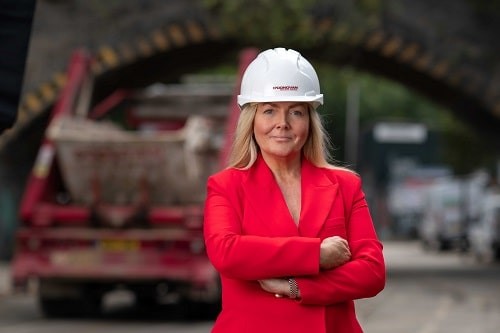 Jacqueline O’Donovan: "A leader needs to lead by decisions."
Jacqueline O’Donovan: "A leader needs to lead by decisions."
Since taking on the role as MD when she was just 19, O’Donovan has ploughed passion and determination into the company first set up by her father in 1959. Her success is reflected in the string of awards she has won both as a businesswoman and for her work in safety and sustainability within the waste sector.
We are here to find out some of the secrets to her success. Running a growing business for 36 years with an unblemished safety record is an impressive feat. With waste still the second most dangerous sector after agriculture, we’re also interested to discover how Jacqueline sees the risk challenges in the sector.
Tough beginnings
Leaving school at 16 with two O levels – in art and child development – waste tycoon wasn’t initially on the cards as career. But her life took a different turn when, tragically, her father Joe died at just 51 years of age while she was 17.
Jacqueline, together with her three siblings, all part of a close-knit Irish family, pulled together to sort out Joe’s business and after a tricky couple of years, they relaunched it. “I think we shocked a lot of people that we’ve done what we’ve done. I think everyone expected us to fall flat on our face.” The opposite was true, with the company turning over £175,000 in its first year. Today, turnover is around £21 million.
It is still a family affair. Her brother Michael is chief executive, responsible for purchasing the assets and looking after the demolition arm of the company. Anthony and Caroline are operations directors. We ask how it is working with family – surely, some frictions? “It’s not a problem, though a lot of people ask that,” she dismisses. “We’ve worked harmoniously at this site for 36 years. We’re just professional in everything we do – and they are happy for me to steer the ship.”
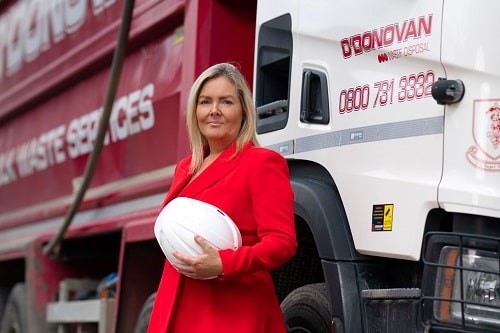 Jacqueline O’Donovan: “It’s important that women who get to the level I’m at, look back down [the ladder] and help the next one up.” Photograph: O’Donovan Waste Disposal Ltd
Jacqueline O’Donovan: “It’s important that women who get to the level I’m at, look back down [the ladder] and help the next one up.” Photograph: O’Donovan Waste Disposal Ltd
Leadership approach
Some people have natural leadership qualities. Jacqueline has an in-built self-confidence and decisiveness, qualities she says which are key to her role. “A leader needs to lead by decisions. The team here couldn’t possibly cope if I was dithering. I can honestly say I have no regrets about any decision that I’ve made either in my personal or my business life to date. I weigh up my options and my decision is made. I’m very proud of that fact.”
But she’s also very present, not just possessing ‘presence’ or the aura of authority. So, staff at the busy Tottenham office where we meet are already peering into the room for her time. “I seem to be the anchor. If I take a week off it’s like the team feels a bit unsteady and as soon as I come back again the ship steadies,” she says. She believes it’s important to be on hand. “I think in some large organisations it can be very hard to get an answer. Whereas they can come up to my door and we go through things together.”
Close to the subject
Here in the head office in Tottenham, North London we are right next to the action. From the window we can see an excavator hungrily pick at waste transferred here by 250 skip loads delivered each day. Beyond, is a three-acre site where the company recycles aggregates which are then certified by the British Standards Industry as safe and sustainable to use. (In the UK, around 200 million tonnes of aggregates are used each year as raw construction materials. Just 28 per cent of UK aggregate demand is met using more sustainable resources.)
We think of glass skyscrapers housing PLCs and their directors at a remove from their projects. Jacqueline gets involved in the nuts and bolts of the business and isn’t hung up on hierarchy – we notice her sweeping the floor earlier: “Someone had come in in mucky boots and it was annoying me,” she says simply. “I make my own tea, there’s no airs and graces.”
Until the age of five, she and her three siblings shared a room with their parents in a one-bed flat in Kilburn. “I think that grounding is really important, and it’s kept my feet on the ground.”
Pioneering safety achievements
Safety is one of the many hats Jacqueline wears. A heap of awards are testament to her success and commitment in this field, not least her OBE, which she received this June in the King’s Birthday Honours list in recognition for her outstanding services to Recycling, to Safety and to Industry. In 2023, the company also earned a FORS Gold – the accredited scheme for fleet operators which recognises high environmental, safety and efficiency standards – for the 12th consecutive year.
Being a pioneer in safety is important to Jacqueline we learn; she has a mind that instinctively seeks her own solutions. The highest proportion of fatal collisions to cyclists involve HGVs – between 2015 and 2017, an HGV was involved in 63 per cent of cases where people were killed while cycling.
In recognition of the crisis, in 2015 she joined working groups to collaborate with manufacturers to re-design lorry cabs. This resulted in the glazed passenger doors now seen on HGVs.
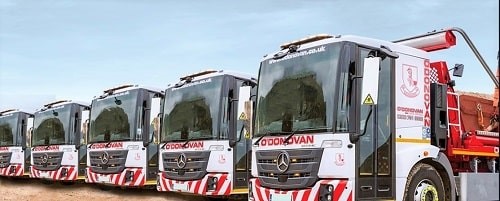 O’Donovan’s fleet of Econic trucks with their large windows have helped improve safety on the roads. Photograph: O’Donovan Waste Disposal Ltd
O’Donovan’s fleet of Econic trucks with their large windows have helped improve safety on the roads. Photograph: O’Donovan Waste Disposal Ltd
The collaboration also saw the first Mercedez-Benz Econic cab be modified from a dustcart body and used on a skip loader body. The new design with floor to ceiling glass and a bigger windscreen ensured greater visibility for the driver and better protection for cyclists and pedestrians. These changes have helped improve the picture so that, today, the number of serious injuries to cyclists caused by HGVs is down from 48 in 2017 to 17 in 2021 (source: Transport for London).
“Our company was the first company in Europe to run the Econic as skip loaders and many in the sector have followed,” she says. “It’s the type of change I like to do, to show people, and they tend to follow. I do find this industry tends to watch others and then if one does it the other follows – that’s good and bad.”
A dangerous industry
O’Donovan Waste Ltd is a bit of an outlier, in terms of its excellence in safety because the industry itself has a terrible track record and image. There have been six fatalities alone this year, with 2023 “on course for one of its most lethal years on record”, according to Materials Recycling World magazine. There are signs of improvement, with non-fatal injuries on a downward trajectory, but the sector remains the second most deadly after agriculture.
Why does she think it performs so badly? She says it’s partly because the industry is so fragmented, made up mostly of independent traders and small companies: “I don’t think they understand how to alleviate the risks.” Also, with costs biting, PLCs who contract out work to these companies have started to ask for services at a lower price while also demanding high safety standards. “Two decades ago, that wouldn’t have happened. You can’t have top quality health and safety trained staff and say you want it cheap as chips.”
In May, two company directors were fined a combined £1.6 million after five agency workers, all from Gambia and Senegal, were killed at a Birmingham metal recycling plant when a wall collapsed on them. It’s a shocking case but typical of the problems in the industry, where rogue traders employ vulnerable or inexperienced workers without giving them proper training, safety procedures and supervision.
At O’Donovan they don’t employ agency workers, preferring a more sustainable and inclusive approach whereby each worker is trained in their own language. Bear in mind, they employ around 14 different nationalities, so that’s quite a feat.
But Jacqueline, in her pragmatic way, says that it’s just sensible: “Different nationalities [of people] tend to come in waves so I don’t think it’s hard to put a bi-lingual mentor in who can speak their language with them.” Most people who work with them end up feeling part of the team: “Many are here for ‘double numbers’, we have a very low turnover of staff. It’s sadly not an approach you see elsewhere.”
Succeeding in a man’s world
It’s a surprise to find out that despite her confidence and prominence, she still has to delicately navigate sexism in this male-dominated sector. “I have to be very mindful in some scenarios. Because if [a man in authority] is saying something I know isn’t right, I wouldn’t like to just blurt that out. I have to say it gently or I will pass it discreetly via a text message to my male counterpart sitting next to me.”
She says it is “terrible” that she has to do that but seeks to change these outdated attitudes by helping other women to succeed and sharing her experiences: “It’s so important that women who get to the level I’m at, look back down [the ladder] and help the next one up. Getting that far and pulling the ladder up is not me at all.” She also mentors and speaks at industry events, demonstrating that it can be done.
So, a businesswoman and a trailblazer for safety in the waste sector. But did you know Jacqueline is also a talented artist? “People are quite surprised that I like my art. I think they assume that because I’m in waste why would you even think about art? But I do love it.” While unwell a few years ago, she would sketch all the flowers people sent her.
Art and creativity is woven into the company’s self-promotion, trouncing the idea that waste has to be dull – its Twitter feed for example is full of interesting posts about working life; not least Johny Rotten doing a gig with the Sex Pistols in the original yard (his father worked at the company for over 40 years).
So, her skills don’t go unused, but for now, she has no time to pick up her sketchbook. “Work is my passion day and night – it continues even when I’m driving home, when I’m watching TV. Work is stimulating because I’m normally the first to do anything in our industry. To enable the rest to follow me and know that it is possible to do it, I’ve got to be there first.”
FEATURES
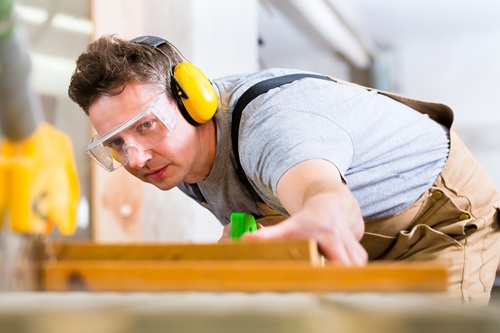
How to mitigate the hearing loss cost escalation tsunami
By Peter Wilson, Industrial Noise and Vibration Centre (INVC) on 06 February 2026
Employers need to adopt the latest and most effective noise risk evaluation and management measures, or face rapidly-rising compensation claims for noise-induced hearing loss at work.

Young drivers and work-related road risk: why employers must act now
By Simon Turner, Driving for Better Business on 06 February 2026
Young drivers have a higher risk of being involved in road collisions due to factors such as their inexperience, so when employing them to drive for work, it is vital they receive the right support to help them grow into safe professionals behind the wheel.
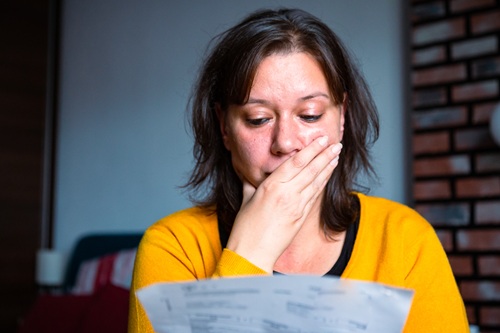
Financial stress: why and how it affects workplace safety
By Chloe Miller, freelance writer on 06 February 2026
Financial worries can lead to cognitive impairment that increases the risk of workplace accidents, so it’s essential employers provide financial education and confidential support for workers who may be struggling with problems like debt and unexpected living expenses.



